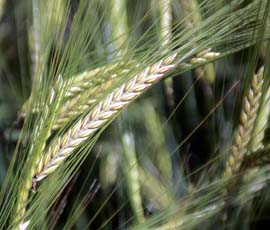Breakthrough in barley disease resistance battle

Scottish scientists have discovered an inherited disease resistance mechanism in barley plants that could lead to disease-resistant barley seed.
A research team from the Scottish Agricultural College has found that barley plants, when stimulated to protect themselves against fungal attack, produce seeds with the same self-defence mechanism built in, protecting the next generation of plants.
“These results raise the possibility of producing seed already primed for resistance to pathogen attack,” says Dale Walters, lead scientist at the SAC.
“This kind on natural in-built protection could be a very useful addition to our battery of crop protection methods,” added Prof Walters.
The research also suggests that other crops, including wheat and maize, could be bred to include resistance, he says.
Researchers used two sets of barley plants, treating one as a control and spraying the other group with acibenzolar-S-methyl and saccharin to stimulate their natural defence mechanism.
The plants were harvested and the seeds re-grown and these offspring plants were then inoculated with rhynchosporium commune, a common fungal disease of barley.
The plants from the parents treated with saccharin and ASM were found to show significantly fewer disease symptoms than the plants from the control group.

